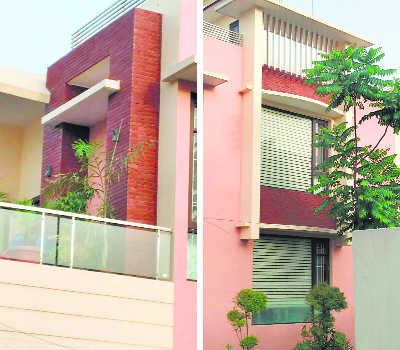
Jagvir Goyal
Each house builder wants to have an attractive front elevation of his house. Different features, projections, angles, railings, paints and materials are thus explored to create that fantastic first impression. Durability and low maintenance, however, remain the main considerations as everyone wants the house to look amazing year after year. Facework brick tiles fall in the category of highly durable and low maintenance material that can be used for the front facades. These tiles look like bricks, but are machine finished to sharp corners and accurate dimensions and thus are suitable for face work of your house. These tiles are different from the ones used in the tile terracing of the house. Let’s have a look at some key features of these tiles:
Where to use?
A projection like the front face of a balcony or a depressed portion of the wall can be selected and earmarked for these tiles and the rest of the area of the elevation can be finished in different materials having colours of the same family. Even if the whole of the elevation is finished in a combination of machine made bricks and face work tiles, it looks strikingly attractive.
Sizes
Face work brick tiles are produced in varying sizes to suit the choice of users. Commonly available sizes are 230 mm x 75 mm, 230 mm x 50 mm and 230 mm x 40 mm. Smaller sizes 110 mm x 75 mm, 110 mm x 50 mm and 110 mm x 40 mm are also available. A common brick has the size of 230 mm x 110 mm x 75 mm (round figures). Thus, the stretcher face has 230 mm x 75 mm size and the header face has 110 mm x 75 mm size.
Face work tiles are produced matching these sizes as well as with smaller depth of 50 mm and 40 mm.
In addition to these, sleeker sizes of 150 mm x 25 mm are also available. A sleeker size demands more time and skill in covering the same area of elevation than the bigger size.
Thickness
Though different sizes of face work tiles are available, the thickness is kept uniform as 20 mm only. It is difficult to achieve even face in this small thickness because of very small surface area of the tiles.
There is no difficulty in achieving even face with stone or ceramic tiles of lesser thickness of 10 mm or 12 mm because their surface area is large. In case of face work tiles, the mason has to really work hard to avoid an uneven surface. That’s why the thickness of these tiles is not kept as 15 mm or lesser. As the tiles are mechanically produced and have very fine edges and uniform thickness, an even surface is achievable.
Colour selection
Terracotta hued tiles are the most preferred these days. Antique-finish tiles are also good choice. The only difference between terracotta and antique-finish tiles is that antique-finish tiles carry random black patches in them to give an antique finish. Some manufacturers also produce brown, chocolate and peach coloured tiles to provide the house owner a wider choice on color front.
Curved surfaces
Curved surfaces are trending again and many house builders choose to have an elliptical or semi-circular balcony that adds a royal look to the elevation. Bay windows also have a geometrically smaller area to be covered with tiles. It is, however, a challenge for the mason to provide face work tiles on these surfaces without the edges of tiles protruding over one another. For such surfaces, header-sized tiles are more convenient as their length is just 110 mm. Depth of tiles may be 75 mm or 50 mm or 40 mm or 25 mm. Sleeker tiles of 150 mm length are also suitable for such surfaces.
Precautions
While ordering face work brick tiles don’t turn a blind eye to the quality irrespective of the brand name. Often these tiles don’t remain straight and develop a little curvature in them due to shrinkage of clay. If such tiles arrive at the construction site, then these should be sorted out and thrown away as there is hardly any scope available to accommodate or hide their defect. Thus, it is better to make it clear to the manufacturer that defected tiles would be returned. Also ensure that the tiles possess zero efflorescence property and zero or negligible water absorption property.
Cost analysis
Providing face work brick tiles in the elevation area demands special skill and extreme patience from the masons executing this work. Preparation of surface, roughening up of plastered surface with wire brush, using of 1 : 3 cement mortar and fixing of tiles should lead to a labour cost of Rs 40 to Rs 50 per square feet. The cost of tiles is about Rs 10 per piece. Taking into account the number of tiles required per square feet, about 10 tiles of 230 mm x 40 mm shall be required per square foot area. Thus, the cost of providing these tiles should be about Rs 150 per square foot. If sleeker sized tiles are used, the cost per square foot will increase further.
— The writer is former HoD and engineer-in-chief, Civil Engineering Department in a Punjab PSU



























